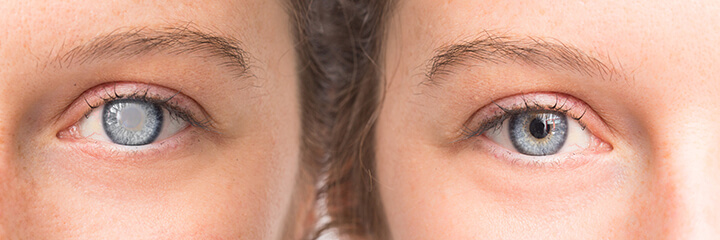About Your Cataract Surgery
A cataract happens when the lens of your eye becomes cloudy. This can happen for many reasons. The most common reason is simply getting older – cataracts affect more than 22 million Americans over age 40, and about 70 percent of adults have cataracts at some point in their lives.

Is it time for cataract surgery?
You may be ready for cataract surgery when your vision makes it difficult to read comfortably, drive, work or do other activities. Dr. Lyons is a highly experienced surgeon who has helped thousands of patients see more clearly. She is happy to evaluate your cataracts and talk with you about the right time for surgery.
Your decision to have cataract surgery depends on several factors, including:
- Your personal needs and preferences
- The results of Dr. Lyons’ evaluation
- Your general health and any other eye conditions
- Your insurance company’s policies on cataract surgery
Almost everyone who has cataract surgery notices improved vision. However, you might not have good vision if you have another eye condition, such as glaucoma or macular degeneration. If you do, Dr. Lyons will talk with you about what your vision may be like after surgery, any risks and the benefits of surgery.
About the procedure
Cataract surgery is a short procedure. It is done at an eye surgery center, so there is no overnight hospital stay. The surgery lasts about 30 minutes, and you leave the center about an hour after surgery is over.
You have local anesthesia for cataract surgery. This is in the form of numbing drops placed in your eyes, so you do not feel anything. We also give you a light sedative, which is medication to help you feel relaxed and sleepy. You do not have to be put completely to sleep. An anesthesiologist or certified nurse anesthetist will be with you during cataract surgery. They will help make sure you are comfortable and safe.
After the anesthesia takes effect, the doctor makes a small incision at the side of your eye. Then she uses a small ultrasound probe to break up the cataract. Another small instrument removes the cloudy tissue with gentle suction. Finally, Dr. Lyons will put in your new IOL.
You will need to wear a protective shield over your eye when you are sleeping for a week after the surgery. You will be able to go home within a half an hour after the surgery, and will need to return for your first followup visit within 24 hours for Dr. Lyons to check your eyes.
Learn how to prepare for your surgery.
Find complete information about cataracts and cataract surgery at the American Academy of Ophthalmology
